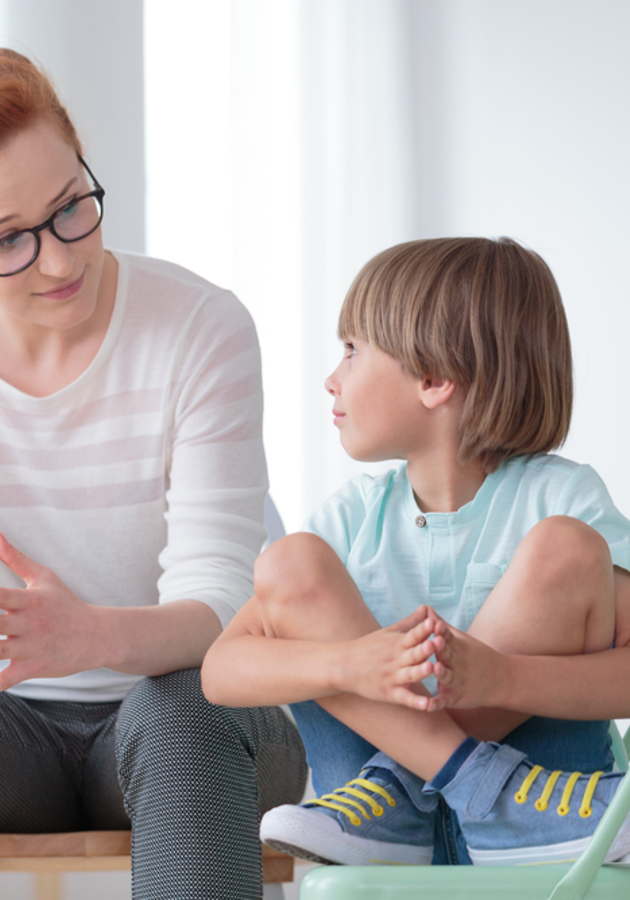Are you a parent who finds yourself in constant conflict with your child, wishing they would “just behave”? Do you feel you have tried everything to help solve this and don’t know where else to turn? In her book, “Peaceful Parent, Happy Kids: How to Stop Yelling and Start Connecting,” clinical psychologist Dr. Laura Markham shares her Three Big Ideas to move away from conflict and parent your children peacefully, in a way that actually helps them grow. So, get ready to learn how to change your parenting mindset so that everyone wins!
The secret to peaceful parenting
Many parents struggle with raising their kids, especially when they are juggling so many other responsibilities. Of course parents want the best for their children, but much of the advice they commonly get for discipline is “counterproductive” and “destructive,” such as saying “let her cry” and “tell him you’ll leave him alone in the supermarket if he won’t stop throwing a tantrum.” These just “create unnecessary struggle and tension between parents and children.” Force only works for a short time while kids are very young, and it doesn’t “respond to the needs and emotions driving that behavior,” Markham says. It just makes things worse. Parents become unnecessarily desensitized to how their children are feeling, instead of doing what makes the most sense - being calm and patient. “Worse yet, [being desensitized] can erode our empathy for our child, because instead of following our instincts — which, naturally, tell us to respond to the needs of our little one — we harden our hearts.”
Parents who are more at peace, on the other hand, have peaceful, happy kids because they have a secret: they talk to themselves, and therefore their kids, in a totally different way, based on Three Big Ideas. These are: Regulating Yourself, Fostering Connection, and Coaching, Not Controlling. Each of these ideas comes with an “Aha! Moment” that really drives the points home. These ideas help improve parents’ approach to parenting, and are inspired by Markham’s work as a clinical psychologist specializing in child development and parenting.
This book is different from most other books on parenting in that it doesn’t center on changing the behavior of the child, but rather on changing how the parent reacts to their child’s actions. With specific examples as well as action plans, you will learn to incorporate the Three Big Ideas into your own parenting. By the end of this process of becoming a peaceful parent, you will have the tools and strategies “to put the joy back into parenting.” You will be equipped to raise an emotionally healthy child, and you’ll also be able to have a strong, fulfilling relationship with them. It’s not easy and requires patience and persistence, but once you put in the work your job as a parent will get much easier, and your kids will be a lot happier too: a win-win!
Regulating yourself
Since “parenting isn’t about what our child does, but about how we respond,” you must first take stock of your own actions before you can address your child’s behavior and emotions. You will not be able to deal with your child in a peaceful manner without making sure you are taking care of yourself emotionally. If you are not able to properly manage your own emotions, you certainly will not be able to teach your child to do the same. So a parent’s top priority must be staying mindful of their own inner state. This involves learning to manage any anger issues you may be dealing with, or even addressing any issues you dealt with in your own childhood. Doing this work will put you in the frame of mind to resist yelling at your kids when something goes wrong, although it will take practice. Mindfulness involves paying attention to the breath and acknowledging your thoughts and feelings.
Once you have established a practice of mindfulness, you will be much better prepared to engage with your kids in a peaceful way. You can’t serve others if your own cup is empty, after all. Once you cultivate a feeling of love and openness for yourself, doing so for your kids will come much more naturally. Instead of seeing a child’s bad behavior as some flaw or defect, you will come to see it as an expression of needs not being met. This is not to say there will never be frustrating times, but at least you can be prepared to deal with them in a thoughtful, productive way. If you listen and allow them to truly express themselves, you will establish a crucial connection with your child that you would never get by yelling or disciplining them. The “Aha! Moment” to remember is “that an adult’s peaceful presence has a more powerful influence on a child than yelling ever could.”
Markham provides a list of “Ten Rules to Raise Terrific Kids” to keep in mind during this initial process of getting to know yourself better. These rules highlight and further emphasize the importance of starting with yourself first, which is half the battle. As Markham points out, “the most important rules to raise terrific children are for us, not our children. We begin with taking responsibility for ourselves and end with connection as the ultimate rule. Everything in between is about coaching for the long term.” The rules include remembering to manage yourself first, being your child’s advocate, avoiding discipline and punishment, providing a safe place to listen, remembering that bad behavior means that needs aren’t being met, expecting change, and staying connected and loving even when things get tough.
Fostering connection
Building on what you’ve learned in step one will help you make a stronger, deeper connection with your child. Once a child feels like their parent is there to help them, not scold them, they will be much more open because they feel secure and loved. Without this connection, all the yelling in the world will not make your child behave better - in fact, it will make the problem worse. This process of connecting starts at birth and continues throughout childhood as the child matures. Even if your connection with your child up until this point has not been great or you find that you deal with conflict with punishment, Markham says it’s never too late to repair things, as long as you’re willing to put in the work. Establishing and maintaining a strong connection and relationship with your child requires a great deal of effort, but it will be worth it. The idea of “quality time” doesn’t apply because it implies that you are not paying adequate attention to your children most of the time, which means your child will find that attention elsewhere. Quality time is found through every interaction, big and small, that you have with your child. Additionally, setting aside times for the family to connect, such as weekend outings, as well as special time with attention for each child, is crucial for strengthening this connection. There are many ways to build this into your daily routine, such as getting ready for the day and bedtime.
This process is not easy and will have ups and downs over time. You will know when things aren’t going well when your child starts to become uncooperative. This may seem like the child “just won’t listen,” but what it really means is that they feel disconnected from you. As Markham explains, “defiance isn’t a discipline problem, it’s a relationship problem.” This doesn’t mean all is lost, but it does mean you need to show more patience and compassion so that the child feels safe and connected again, a process which requires being aware of your own emotional state, as well as the child’s. What will be successful will vary with each child, but approaching the situation with a sense of love and openness will go a long way. Think of this as filling the child’s “emotional bank account.” Markham sums up, “deepening our connection with our child will always help, no matter how challenging the child or the situation.” Demonstrating this emotional maturity will give your child a model for doing the same. The “Aha! Moment” here is to keep in mind is that the “loving connection that makes our hearts melt is what puts the joy back in child-raising,” which will “strengthen and sweeten your connection with your child.”
Coaching, not controlling
After you’ve learned to regulate yourself and foster connection, the final piece of the puzzle is teaching your child what you’ve now learned - that is, how to manage their emotions in a healthy way. The keys to this are emotion coaching, loving guidance, and supporting mastery. Teaching children emotional intelligence is just as important as anything else we teach them, because it’s part of every relationship we have with other people. Just like with fostering connection, you can start helping your child coach their emotions from infancy. The key, as always, is giving the child a sense of a safe, loving environment. This technique is the opposite of what parents often hear, which is to let their child “self-soothe,” or leave them alone to cry without comforting them (even though our instincts tell us we should comfort them!). Parents may think they are helping the child by allowing them to learn how to self-soothe, but this really just creates disconnection, which doesn’t help anyone.
This coaching process starts with empathy, which involves listening and setting healthy limits. Children need help talking out their emotions - especially strong ones like anger - with a parent who they feel is really listening. Through this process, you will understand what your child’s deepest needs are, and how to best serve them. Doing this is the exact opposite of discipline or punishment, so it may be hard at first. The key here is guiding them towards more positive behaviors without being strict or harsh. The “Aha! Moment” of emotion coaching is “that the coaching approach that works best in the long-term to raise happy, responsible adults is actually more effective than traditional parenting in producing self-disciplined, cooperative kids in the medium term.”
The effectiveness of the techniques described in this book will vary with each child, depending on their individual personality and needs. Depending on the situation, you may need to seek additional professional help. But what doesn’t change is your responsibility as the parent to cultivate love, openness, and empathy, and helping your child work through their emotions instead of bottling them up. All of this will help make parenting a joy, which is what it always should be. If at any point you feel frustrated or discouraged, remember these words from Dr. Laura Markham: “There are no perfect parents, and no perfect children. But there are many families who live in the embrace of great love. This book is dedicated to you creating one of those families.”
Final Notes
Raising a child is never easy and no parent will ever be perfect. But by changing your mindset - from one of negativity, discipline, and punishment to one of mindfulness, love, and empathy - you will be amazed at how your child will grow and your relationship with them will improve. This will help improve your own emotional intelligence and skills, even if you didn’t grow up with a healthy set of these, while also helping your child to grow into a happy, mature adult.
12min Tip
Creating and strengthening a true emotional connection with your kids is based on love and empathy, and is the key to having happy, healthy kids - and less stressed-out parents. This will not only benefit your kids, but it will help you as well, as you learn to take stock of your own emotional well-being, so everyone truly wins.




























